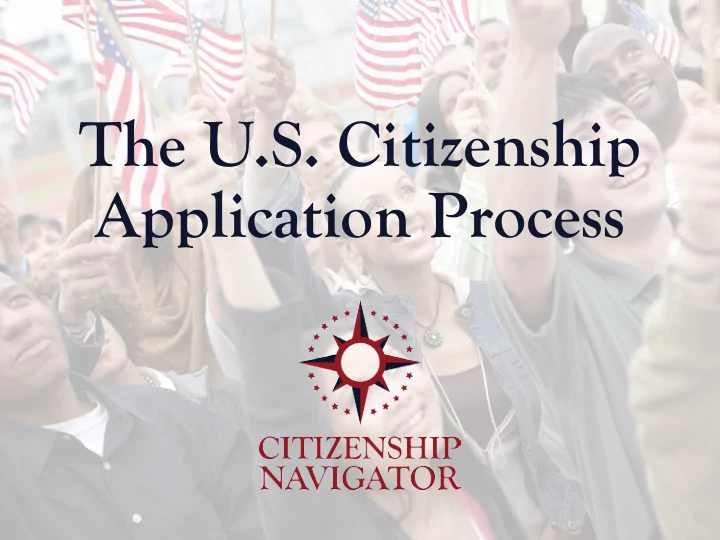

The U.S. Citizenship Application Process
WELCOME CLINIC's Citizenship Navigator and text4refugee Projects are funded through the Department of Health and Human Services, Administration for Children and Families, Office of Refugee Resettlement, Grant # 90RB0051-01-00. The contents of this publication do not necessarily reflect the views or policies of the funders, nor does mention of trade names, commercial products or organizations imply endorsement by the U.S. Department of Health and Human Services. This resource may be duplicated for noncommercial uses without permission.
Agenda What is naturalization? Benefits of citizenship Primary reasons why people don’t apply for citizenship Citizenship application requirements Overview of the application process Overview of the citizenship interview Things that complicate the application process How to protect yourself Helpful resources Questions
Naturalization is the legal process a non-U.S. citizen undergoes to become a citizen of the United States.
Sign up for 2 free texts a month about citizenship. Subscribe for messages in Arabic, English, French, Nepali, Somali or Spanish. Text 1 to 1-352-NEW2USA to receive messages in English.
Benefits of Citizenship
Benefits of Citizenship Help additional family members become citizens
Benefits of Citizenship Vote in elections
Benefits of Citizenship Access better jobs and educational scholarships
Benefits of Citizenship Serve on a jury
Benefits of Citizenship Access public benefits
Benefits of Citizenship Travel to other countries easier, without worry about re-entering the U.S.
Benefits of Citizenship Receive assistance from the U.S. embassy when abroad
Benefits of Citizenship Live outside the U.S. without time limits
Benefits of Citizenship Keep your residency
Why Don’t People Apply for Citizenship?
Why Don’t People Apply for Citizenship? • Requirement to speak, read and write English • Requirement to learn U.S. Civics • Cost of application is high • Lack of assistance with application • Lack of knowledge of benefits and requirements • Idea that the application process is complicated
Citizenship Application Requirements
Nine Citizenship Application Requirements 1. Be at least 18 years old 2. Be a lawful permanent resident (LPR or green card holder) for five years (three years if you are married to a U.S. citizen) 3. Live in the U.S. as an LPR for the past five years (three years if you are married to a U.S. citizen) 4. Be present U.S. for at least half of the five years (or half of the three years if married to a U.S. citizen) before applying for naturalization
Nine Citizenship Application Requirements 5. Live in the USCIS district or state in which you are applying for at least three months 6. Pass a test on speaking, reading, and writing basic English 7. Pass a test on U.S. history and government 8. Have good moral character 9. Understand and accept the oath of allegiance to the U.S.
The Application Process
Overview of the Application Process Gather required Check to see if Complete the Submit documents and you are eligible N-400 application. payment. Attend the Attend the Take the oath of Attend the oath citizenship biometrics allegiance. ceremony interview. appointment.
Eight steps of the Application Process 1. Consult with an authorized immigration legal service provider to see if you are eligible to apply for U.S. citizenship. 2. Obtain and complete a copy of the “Application for Naturalization” (N-400) form. 3. Gather the required documents and payment.
Eight steps of the Application Process 5. Submit the application. 6. Attend the biometrics appointment. 7. Attend the citizenship interview. 8. Attend the oath ceremony and take the oath of allegiance.
Overview of the Citizenship Interview
Overview of the Citizenship Interview The interview begins The interview begins You will be the moment the with questions based officer calls your sworn in. on the N-400 form. name. The applicant The applicant The applicant takes completes the completes the the U.S. Civics test. English writing test. English reading test.
More about the English and Civics Tests The English reading test The interviewer will show the applicant a sentence in English. The applicant will need to read the sentence aloud correctly. The English writing test The interviewer will say a sentence in English. The applicant will need to write it down correctly. The U.S. Civics test The interviewer will ask the applicant up to 10 Civics questions from USCIS’ list of 100 questions. The applicant must answer 6 correctly. Find the 100 questions at cliniclegal.org/citizenshiptest
Complications in the Application Process
Complications in the Application Process • You have been arrested and/or convicted of a crime. • You lied to USCIS to get a green card for yourself or someone else. • You lied or did not tell the complete truth in order to get public benefits.
Complications in the Application Process • You did not file your federal income tax returns. • You helped someone enter the U.S. illegally. • You did not support your children who live apart from you. • The information on your N-400 is different from what you wrote on your green card or refugee application
Protect Yourself Against Fraud
Five Tips to Protect Yourself Against Fraud 1. In the United States, only attorneys and Department of Justice trained representatives can provide legal advice and services about immigration. 2. In the United States, notary publics cannot give legal advice or provide immigration services. 3. All USCIS forms, such as the N-400, are free of charge. 4. Avoid paying cash for immigration services. Forms like checks, money orders, or credit cards ensure you have a record of expenses. 5. Keep copies of every document which you sign.
Resources USCIS: A Guide to Naturalization www.uscis.gov/us-citizenship/citizenship-through-naturalization/guide- naturalization The Citizenship Test (CLINIC’s study guide) and translations of citizenship test questions www.cliniclegal.org/citizenshiptest Find English or Citizenship Classes my.uscis.gov/findaclass Get more resources at cliniclegal.org/citizenship
THANK YOU Learn more about CLINIC at cliniclegal.org.
Recommend
More recommend